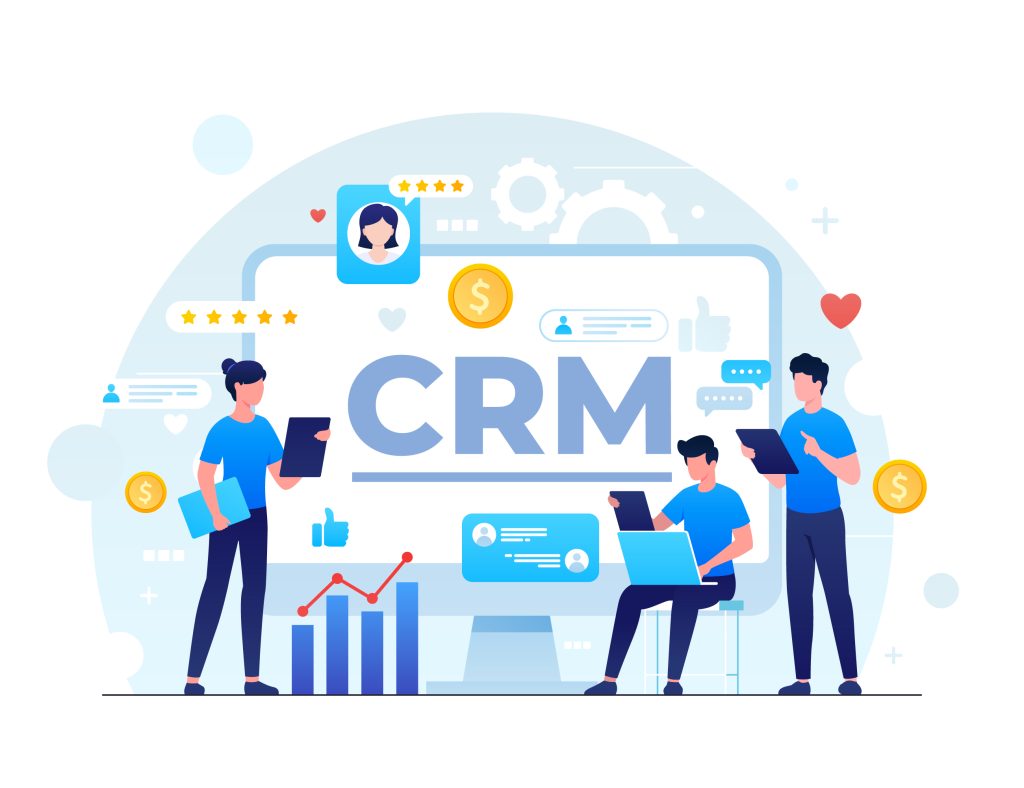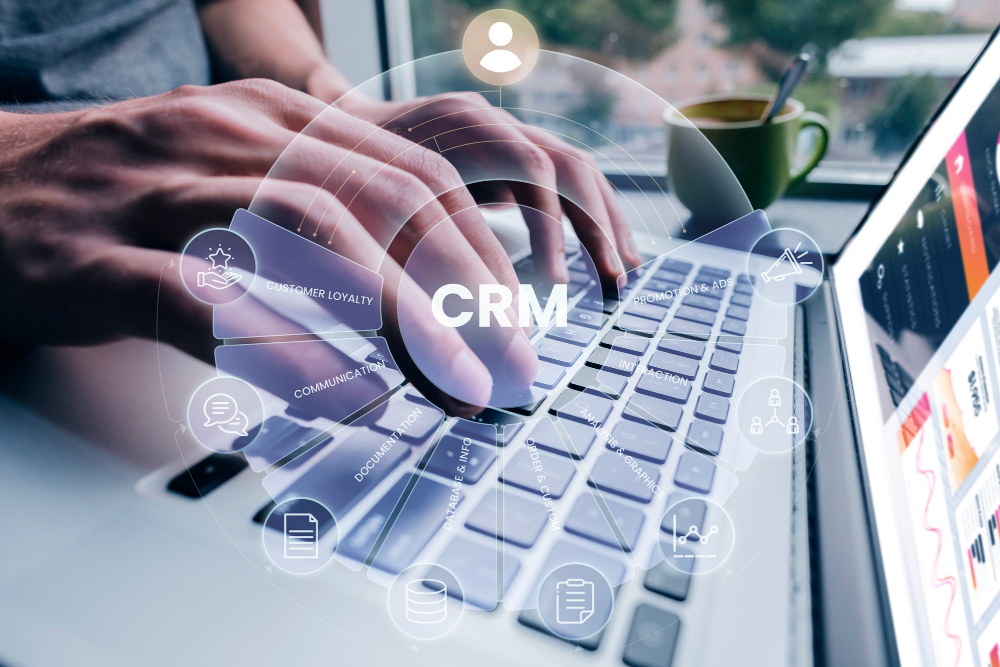How CRM Software Transforms Accounting Firms for Better Client Management

If you’re an accountant, you know the drill: tons of clients, paperwork, deadlines, and lots of coffee. But what if there was a way to streamline your client management, making it not only manageable but efficient? Enter CRM for accountants—the unsung hero you didn’t know you needed. With accounting CRM software like Salesforce, Pipedrive, Creatio, Capsule, and Zoho, you can revolutionize how you handle client relationships. It’s all about smart, structured customer relationship management that can save you a headache or two.
Understanding CRM for Accountants

In today’s fast-paced business world, accounting isn’t just about crunching numbers; it’s about fostering relationships and ensuring every client feels valued and understood. Cue the introduction of CRM for accountants—a tool that’s becoming essential for modern accounting firms. But what exactly is a CRM, and why is it so important to accountants? Let’s break it down.
Definition and Importance
CRM stands for Customer Relationship Management. At its core, it’s a technology that helps businesses manage all interactions with current and potential clients. For accountants, this means having a digital system where every client interaction is tracked, recorded, and utilized to improve service delivery and client satisfaction. It’s more than just a glorified address book; it’s a strategic tool that helps accounting professionals deliver personalized experiences, boost efficiency, and ultimately, retain clients.
Why is this important? Imagine being able to have detailed client information at your fingertips, from previous conversations and transaction history to future appointments. This not only saves time but also enhances the quality of communication, ensuring clients feel heard and valued. A well-implemented CRM can be the difference between just another transaction and a long-term client relationship.
How CRM Software Benefits Accounting Firms
Implementing CRM software and solutions in accounting firms can introduce a host of benefits that address not only client management but also internal efficiencies. Here’s a glimpse into how CRM software can transform an accounting practice:
– Streamlined Client Management: CRMs centralize client data, making it easier for all team members to access the information needed to serve clients efficiently. This centralization helps eliminate data silos and prevents communication breakdowns.
– Enhanced Communication: With CRM software, accountants can schedule timely follow-ups and reminders, ensuring no client inquiry falls through the cracks. Automated emails and alerts keep the team and clients informed about important deadlines and updates.
– Data-Driven Insights: CRMs provide valuable analytics and reporting tools. This allows firms to track key performance indicators such as client retention, service usage, and even employee performance. Having these insights at your fingertips helps in strategizing business growth and improving services offered to clients.
– Improved Time Management: By automating routine tasks like billing reminders and follow-up emails, accounting professionals can focus on critical tasks that require their expertise. This frees up valuable time and resources, boosting overall productivity.
– Personalized Client Experiences: With CRM, every client interaction can be personalized. From addressing clients’ specific needs to sending them birthday wishes, these seemingly small touches can make a significant impact on client satisfaction and loyalty.
Key Features of Accounting CRM Software
To reap these benefits, it’s crucial to choose a CRM with features tailored for accounting. Here are some must-have features:
– Contact Management: Ability to store and organize client contact information, notes, transaction history, and other pertinent details all in one place.
– Task and Workflow Automation: Automation of repetitive processes, such as sending follow-up emails or reminders, which allows accountants to focus more on strategic tasks.
– Document Management: Essential for organizing digital documents like tax forms, financial reports, and communication records easily accessible within the CRM system.
– Pipeline and Opportunity Management: Functions that allow accountants to keep track of potential leads and existing client opportunities, ensuring nothing is overlooked.
– Integration Capabilities: Seamless integration with existing accounting tools, such as QuickBooks or Microsoft Excel, providing a more cohesive working environment.
– Reporting Tools: Robust reporting features that provide insights into business operations and performance, helping firms make informed decisions.
Popular CRM Solutions for Accounting

Now that we’ve established the importance of CRM systems for accountants, let’s take a look at some popular solutions on the market and what they have to offer.
Salesforce for Accounting
When talking about CRM solutions, Salesforce often comes to mind first—and for good reason. Salesforce is a giant in the CRM world known for its robust functionality and adaptability. For accounting, Salesforce offers several specialized tools through its Financial Services Cloud. This suite provides accountants with a 360-degree view of their clients, integrating data from multiple sources to ensure comprehensive client profiles.
Salesforce’s key strengths include its flexibility and scalability. It can be customized to match the specific needs of an accounting firm, whether that’s managing a small client roster or a global enterprise. Additionally, with its strong analytical tools, accountants can produce reports that provide insights into client behavior and firm operations. While it may come with a steep learning curve and can be on the pricier side, Salesforce’s comprehensive capabilities make it an unmatched powerhouse.
Pipedrive and its Features
Pipedrive is another CRM that accountants can turn to for streamlining their client management processes. What sets Pipedrive apart is its simplicity and ease of use—an excellent choice for those new to CRM systems. It’s visually intuitive and is especially loved for its pipeline management features, making it easy to track the progress of deals and client interactions through a visual dashboard.
Key features of Pipedrive include its robust sales management tools, which seamlessly adapt to customer relationship processes within accounting firms. It also allows for easy integration with over 150 apps and platforms, making it highly versatile and compatible with existing tools accountants use. Although it might not offer as many advanced features as Salesforce, its user-friendly design and straightforward approach offer an attractive option for small to medium-sized accounting businesses.
Comparing Creatio and Capsule
Getting the right CRM fit might mean comparing the options. Creatio and Capsule are two more CRM solutions popular with accounting professionals.
– Creatio: Known for its process-driven approach, Creatio is built around automating workflows and making operations more efficient. It’s highly customizable and offers a tech-driven solution with AI-powered tools for predicting client needs and behaviors. Though packed with features, the CRM might be a bit complex for very small firms.
– Capsule: On the flip side, Capsule shines with its simplicity and affordability. It’s perfect for smaller accounting practices looking for a straightforward tool to organize contacts, track conversations, and manage tasks without overwhelming features. Capsule’s intuitive design also makes it an excellent entry-level CRM for those dipping their toes into digital client management.
Both Creatio and Capsule offer unique advantages, but the choice largely depends on the size and needs of the accounting practice. Creatio’s strength lies in automation and customization, suitable for firms that have the bandwidth to leverage advanced functionalities. Capsule, meanwhile, appeals to firms seeking simplicity and cost-effectiveness.
Exploring Zoho CRM
Zoho CRM has been gaining traction among small to medium-sized accounting firms due to its user-friendly platform coupled with affordable pricing options. It boasts a wide range of features, including lead management, contact management, and workflow automation which are essential for effective client management.
Zoho’s biggest advantage is its ecosystem—being part of the broader Zoho suite, it integrates seamlessly with other Zoho applications, such as Zoho Books for financial management or Zoho Projects for tracking tasks. This makes it incredibly appealing for accounting firms that already use or plan to use other Zoho services.
In addition, Zoho CRM offers AI capabilities with Zia, Zoho’s AI assistant, which can predict sales trends, suggest workflows, and even provide sentiment analysis from client interactions. With its competitive pricing and integration capabilities, Zoho CRM can offer a robust and reliable solution for accounting firms looking to enhance their client management processes without breaking the bank.
In conclusion, choosing the right CRM for an accounting firm is a significant decision that can positively impact not only client relationships but also the firm’s operational efficiency. Whether it’s the powerhouse that is Salesforce, the simplicity of Capsule, or the integrative approach of Zoho, each CRM offers unique features and advantages. The key is to focus on what the firm needs most—whether it’s in-depth analytics, seamless integration, or simple yet effective client management—and choose a CRM that fits those needs. With the right CRM system, accounting firms can look forward to improved client interactions, streamlined operations, and a solid foundation for growth.
Implementing CRM in an Accounting Firm
Incorporating Customer Relationship Management (CRM) software into an accounting firm might sound like you’re trying to fit a square peg into a round hole. But guess what? This “square peg” actually fits perfectly and can transform your client management operations from a chaotic mess to a well-oiled machine. Let’s explore how to get it rolling.
Steps for Successful CRM Integration
Bringing CRM software into your accounting firm isn’t as simple as flipping a switch. It’s like assembling a puzzle, and here are the pieces in the right order:
1. Assess Your Needs: Start by identifying what you really need from a CRM system. Is it better client communication, streamlined workflows, or even specific reporting capabilities? Understanding your needs sets the stage.
2. Choose the Right CRM: Not all CRMs are created equal. Within the accounting realm, tools like Salesforce, Pipedrive, Creatio, Capsule, and Zoho shine for various reasons. Take the time to demo these options and play around with features to see what clicks.
3. Data Migration: This is the oft-dreaded phase, but it’s crucial. Safely transfer your existing client data into the CRM system. This might involve cleaning up your data, which everyone loves, right?
4. Customize the CRM: Tailor the software to match your firm’s workflow. Customize dashboards, reports, and automate frequent tasks so you’re not reinventing the wheel every week.
5. Test and Refine: Before going full throttle, test the CRM with a small team. Gather feedback and tweak accordingly to smoothen rough edges.
6. Full Rollout: Gradually introduce the CRM to the entire firm. A phased approach helps minimize disruption and eases everyone into the new system.
Completion of these steps means you’re on your way to hitting the sweet spot of efficiency with this powerful tool.
Training and Support for Staff
A shiny new CRM won’t do any good if your staff treats it like an alien tool. It’s vital to equip your team with the skills and confidence to handle this new beast. Here’s how you can achieve that:
– Training Sessions: Conduct regular training workshops focusing on everything from basic navigation to advanced features. A mix of in-person sessions and online tutorials caters to different learning styles.
– Buddy System: Pair less tech-savvy team members with a CRM enthusiast. This personal mentorship can soften the learning curve.
– Documentation and Resources: Maintain an accessible repository of guides, FAQs, and video walkthroughs. Being able to self-help is a superpower.
– Continuous Feedback: Encourage staff to share what’s working and what’s confusing. Use this feedback to adjust training materials and CRM usage guidelines.
– Vendor Support: Leverage the support channels your CRM vendor provides. Whether it’s 24/7 helplines or community forums, they’re there to help get you unstuck.
Proper training ensures everyone’s singing from the same CRM hymn sheet, driving the firm toward greater productivity.
Overcoming Common Challenges
Like any tech transition, integrating CRM in accounting firms is not without hurdles. Here’s how to tackle those pesky challenges:
– Resistance to Change: This is normal. Mitigate it by communicating the benefits clearly and demonstrating how the CRM will make everyone’s job simpler, not harder.
– Data Security Concerns: Handle this by teaching your team about the software’s security measures, including encryption and access controls, reinforcing trust.
– Integration with Existing Systems: This can be tricky. Seek CRM solutions that offer connectors or APIs for smooth integration with your accounting software and existing tools.
– Time Investment: Implementing a CRM is not an overnight job. Set realistic timelines and ensure minimal disruptions by breaking the project into manageable phases.
Overcoming these barriers gets you closer to the nirvana of seamless client management.
Enhancing Client Management with CRM

An accountant’s plate is often piled high — client data, compliance details, changing regulations, the works. CRM software is like having an organizational wizard at your disposal. Let’s delve into how it enhances client management.
Streamlining Client Communication
Communication is the backbone of any relationship, and it’s no different in accounting. Here’s how a CRM makes it a breeze:
– Centralized Communication: All client interactions, whether emails, calls, or meetings, are logged in one place. This way, anyone stepping in can access a full history, ensuring nothing slips through the cracks.
– Automated Reminders: Never miss sending a friendly prompt for document submissions or an impending tax deadline. These reminders can be automated, freeing up your mental bandwidth for higher-priority tasks.
– Consistent Branding: Templates for common communications ensure that every client email or letter is professional and on-brand.
In a nutshell, CRM creates a communication ecosystem where clarity and consistency reign supreme.
Efficiently Managing Client Data
Ah, data management — often viewed as the bane of accountants’ existence. However, with CRM, it morphs from a tedious task to seamless efficiency:
– Single Source of Truth: The CRM houses everything you’d need to know about a client, from contact details to transaction history. This consolidated view reduces confusion and errors.
– Smarter Data Entry: Automate routine data entry with CRM’s form fill features. Less manual entry means fewer mistakes. Not to mention, it’s a huge time-saver.
– Real-Time Updates: Clients update their details? With CRM, everyone stays informed in real-time, thanks to nifty cloud updates.
– Analytic Dream: CRMs offer insightful reports and analytics, transforming raw data into meaningful insights. Whether it’s identifying client patterns or measuring efficiency metrics, it’s all there.
Managing client data efficiently means more time spent on strategic tasks and less time drowning in paperwork.
Personalizing Client Interactions
Clients come to accountants seeking not just expertise but also a personal touch that reassures them you’re in their corner. Here’s how CRM helps with personalization:
– Tailored Communication: Use CRM to segment clients based on different criteria (like services availed or business size) then send targeted correspondences that resonate.
– Personal Insights: Access each client’s preferences and past interactions to customize meetings or discussions. Remembering little details can turn good service into exceptional.
– Lifecycle Tracking: CRMs enable tracking the client lifecycle. Whether onboarding a new client or offering additional services to an existing one, knowing where they are on their journey helps tailor interactions.
– Automated Personal Touches: Even automated messages can be personalized. Use dynamic fields for names and services mentioned to maintain a human touch in automated communications.
With CRM, it’s easier to make each client feel like they’ve got your undivided attention, keeping them happier and more loyal.
Incorporating a CRM within accounting firms might seem daunting, but it’s a leap well worth taking. It streamlines processes, enhances communication, and personalizes client service, ultimately leading to a more efficient and client-friendly operation. So, dive in and transform how you manage relationships, because in the world of accounting, strong relationships make all the difference.
Conclusion
In a nutshell, adopting CRM software for your accounting firm can be a real game-changer. It streamlines client management and keeps all the crucial information at your fingertips. Whether you’re using big names like Salesforce, Pipedrive, or Zoho, or exploring options like Creatio and Capsule, integrating a CRM is about making your workflow smoother and your client interactions more efficient. It’s all about enhancing relationships and making sure nothing falls through the cracks. Give it a shot—your future self (and clients!) will thank you.
You might also be interested Top 5 CRM Platforms for 2025: A Comprehensive Comparison



